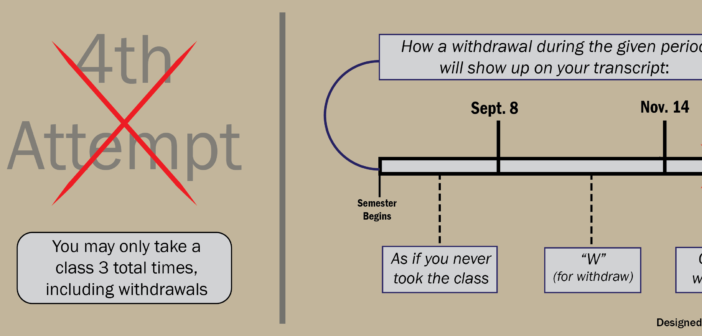Starting this year, a new registration policy will not allow students to take same course more than three times.
In the past, students were able to retake a course as many times as they needed, but professors no longer believe this policy is helpful.
The policy update was first voted on and passed during the 2013-2014 academic year. However, it is only going into effect now because the Educational Policy Committee believed students who came to Lehigh under the original policy should be able to see it through during their time on campus.
The committee is made up of representatives from all three colleges, as well as student representatives. Members discuss issues related to undergraduate educational policy.
Anne-Marie Anderson, a professor of finance and the chair of the Educational Policy Committee, said when she sees a student continuously retaking courses, she questions whether or not they are in the right major.
Steven Wilson, a vice provost for academic affairs, said faculty is interested in actually seeing students progress toward their degrees.
“The infinite loop of beating your head against the same course over and over again didn’t seem to be useful for that,” Wilson said.
A 2013 study conducted by Lehigh entitled “Limiting Undergraduate Course Repetitions,” found that over the course of two years, 2,263 students took a course twice, 332 took a class three times and 57 took a course four times. Nineteen students took a class five times, seven took a class six times and three took a class seven times.
The study, which according to Anderson was conducted for the proposal and is not published online, noted the number of students taking a course for the fourth time was significantly lower than the number who took a course three times. This led the Educational Policy Committee to pick two times as the course re-enrollment limit bringing the total of allowed attempts to three.
According to the study, the committee decided to implement the new registration policy for several reasons, including skewed grade distributions and the fact that 1/8 of students who retook a class did not pass the class in subsequent attempts.
The committee also considered that in classes with low seat counts, students who retake the course might take seats from students who have never taken it before. Additionally, students who are repeating a class often know more information than those who are not.
Catie Owen, ’19, believes the new registration policy might hurt people more than it helps.
“No one goes into a class wanting to drop it because then we’re just sitting there wasting our time for however long we’re taking it and wasting our parents’ money,” she said.
Owen said sometimes students drop a class because they simply don’t have the time for it, not because they don’t understand the material.
“It’s not that we don’t want you to repeat,” Anderson said. “It’s that we want you to be successful.”






Comment policy
Comments posted to The Brown and White website are reviewed by a moderator before being approved. Incendiary speech or harassing language, including comments targeted at individuals, may be deemed unacceptable and not published. Spam and other soliciting will also be declined.
The Brown and White also reserves the right to not publish entirely anonymous comments.